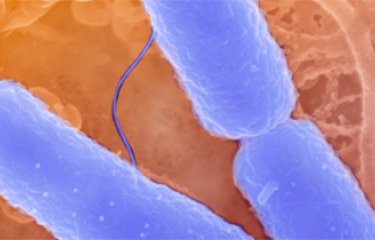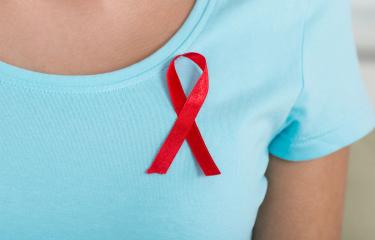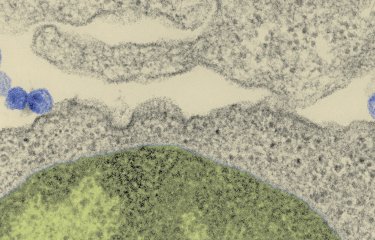Using an ancient scourge to combat a new one, researchers from GlaxoSmithKline Biologicals and the Institut Pasteur announced a new European collaboration to develop an AIDS vaccine by fusing genes from the human immunodeficiency virus (HIV) onto an existing measles vaccine.
Press release
Paris, november 28, 2005
GSK Biologicals will license the measles vaccine vector technology from Institut Pasteur and the two entities will jointly develop the AIDS vaccine. The measles vaccine, based on the Schwarz strain of the measles virus, is known to confer very long-lasting immunity. Scientists hope that using this vaccine as a carrier to deliver HIV proteins will allow them to produce a uniquely potent and long-lasting vaccine to prevent AIDS.
Announced in the week of World AIDS Day, which falls on December 1st, the initial project is being supported by a €5.5 million grant from the European Union. It will be conducted in collaboration with 4 research centers in France, Belgium and the United Kingdom. The participating centers are the Cochin Hospital’s CIC de vaccinologie Cochin Pasteur in France; Ghent University’s Centre for Vaccinology in Belgium; and St. George’s Hospital Medical School’s Vaccine Institute and the National Institute for Biological Standards and Control, both in the United Kingdom.
The project envisions development of a production process for the experimental vaccine as well as two clinical studies. The first study will evaluate the safety profile of the vaccine candidate, and the second will examine safety as well as the vaccine’s immunogenicity in volunteers with pre-existing immunity to measles. The clinical studies will begin in the third year of the four to five year collaboration.
"The gravity of the global AIDS crisis requires us to examine every viable option to develop a safe and effective vaccine," said Jean Stéphenne, President of GlaxoSmithKline Biologicals, the vaccine division of GSK. "We are excited to be collaborating with Institut Pasteur, which brings a distinguished history and its innovative measles vector technology to this collaboration. We also applaud the European Union for providing much needed financial support. This is a model public-private partnership. GSK is pursuing a number of different AIDS vaccine approaches. Our goal is to develop an AIDS vaccine and to make it available to all who need it."
GSK is very active against the three major global infectious disease threats and is pleased to contribute its scientific research and industrial expertise to the fields of HIV, TB and malaria.
Alice Dautry, President of the Institut Pasteur, added: "More than 20 years after the discovery of HIV in the Institut Pasteur, the researchers of the Institut are still committed to innovative research efforts to fight this unacceptable threat. We are pleased to develop this programme with the support of the European Union and to be collaborating with GlaxoSmithKline, a leader in developing vaccines against a broad range of diseases, including HIV."
Octavi Quintana-Trias, Director of Health Research at the European Commission, said that "Industry involvement is paramount for the development of an effective and safe HIV vaccine. The European Union is promoting the collaboration of academic and industrial partners in innovative research projects. The collaboration of one of the world’s leading vaccine manufacturers with a world-leading biomedical research centre will certainly have a major impact in the HIV vaccine field. This project adds to the ten new research projects on HIV/AIDS that the European Union will finance this year."
Earlier this year, GSK Biologicals announced it is collaborating with the International AIDS Vaccine Initiative to develop an AIDS vaccine using nonhuman primate adenovirus vector technology. GSK Biologicals also has an in-house AIDS vaccine development project using the company’s proprietary adjuvant technology. A successful AIDS vaccine might need to combine several of these approaches.
AIDS research is one of the strategic objectives of the Institut Pasteur. In Paris, around fifteen teams are working on different approaches covering most priority fields of HIV research today and several programmes are underway on potential vaccines. Many programmes are run in cooperation with the National Agency on AIDS Research (ANRS) and in collaboration with the Institut Pasteur International Network.
The participating academic centers -- Cochin Hospital’s CIC de vaccinologie Cochin Pasteur in France; Ghent University’s Centre for Vaccinology in Belgium; and St. George’s Hospital Medical School’s Vaccine Institute and the National Institute for Biological Standards and Control, both in the United Kingdom--bring complementary research skills and a unique group of talented scientists to the collaborative effort and will help foster European collaboration.
About GSK Biologicals
GlaxoSmithKline Biologicals, one of the world’s leading vaccine manufacturers, is located in Rixensart, Belgium. GSK Biologicals employs more than 1,100 research scientists who are devoted to discovering new vaccines and developing more cost-effective and convenient combination products to prevent infections that cause serious medical problems worldwide. In 2004, GSK Biologicals distributed more than 1.5 billion doses of vaccines to 168 countries in both the developed and developing world, an average of 45 doses per second. GlaxoSmithKline - one of the world’s leading research-based pharmaceutical and healthcare companies - is committed to improving the quality of human life by enabling people to do more, feel better and live longer. For more information, see www.gsk.com.
About Institut Pasteur
The Institut Pasteur is one of the world’s leading biomedical research centre. Founded by Louis Pasteur in 1887, it is a private, non-profit foundation dedicated to the prevention and treatment of diseases through biological research, education and public-health activities. Close to 2,600 people work on its campus in Paris, where a large part of its research activities are devoted to infectious diseases and 10% focuses on AIDS research. Since it was set up, the Institut Pasteur has played a major role in combating diseases such as rabies, plague, diphtheria, tetanus, typhus, tuberculosis, hepatitis B etc. The Institut Pasteur in Paris is the heart of an International Network made up of 29 institutes spread over the five continents and bringing together 9,500 people.
For more information, see www.pasteur.fr.
Contact press
GlaxoSmithKline Biologicals
Anne P. Walsh + 32 2 656 9831(T) +32 475 835 782 (M)
Alice Grasset +32 475 309 020 (M)
Institut Pasteur
Nadine Peyrolo +33 145 688 147 (T) - npeyrolo@pasteur.fr
Commission Européenne
Manuel Romaris + 32 2 295 6557 (T)





